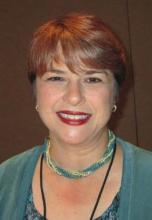LA JOLLA, CALIF. – When older adults with generalized anxiety disorder ask Julie Wetherell, Ph.D., for a nonmedication approach to deal with their symptoms, she faces a certain quandary.
"One of the most striking things to me as a psychotherapist working with older adults is how relatively ineffective psychotherapy is for anxiety in later life, as compared to psychotherapy for geriatric depression or psychotherapy for anxiety in younger or middle-aged people," Dr. Wetherell, of the psychiatry department at the University of California, San Diego (UCSD), said at the annual meeting of the Anxiety and Depression Association of America.
"When older people come to me with depression and they say, ‘I want a nonmedication approach,’ I say, ‘Fine. I have 10 or 12 interventions I can try and I’m confident they will work.’ But when someone comes to me and their primary problem is anxiety, I feel anxious, because I don’t have that level of confidence."
Data from a meta-analysis of 89 studies comparing psychotherapy with medication for depression found no significant difference between the two approaches (Am. J. Psych. 2006;163:1493-1501). However, a meta-analysis of 32 studies comparing psychotherapy with medication for anxiety found that patients treated with medication fared significantly better on clinician-rated outcome measures (P less than .001) (Am J. Geriatr. Psych. 2007;15:639-51). "The difference is not in the medications," said Dr. Wetherell, who was not involved with either study. "The odd man out is the psychotherapy for older adults with anxiety. Cognitive-behavioral therapy for generalized anxiety in older adults is better than nothing, but it’s not much better than nothing. We’re really not getting the results we would like to see with CBT for older people with GAD [generalized anxiety disorder]."
In a study soon to be published in the American Journal of Psychiatry, Dr. Wetherell and Dr. Eric Lenze conducted a randomized controlled trial that combined the selective serotonin reuptake inhibitor (SSRI) escitalopram with CBT in 73 older adults with GAD.
"We proposed a model by which older adults with GAD would first be treated with an SSRI to help with acute levels of distress and somatization," explained Dr. Lenze, a geriatric psychiatrist affiliated with the psychiatry department at Washington University in St. Louis, who specializes in anxiety disorders. "Then, after those benefits are realized with medication, [we would] continue the medication but add a course of CBT to address some of the underlying pathological worry that doesn’t seem particularly responsive to medication, and to improve coping skills as well."
Measures for the trial, which was carried out at the University of Pittsburgh, Washington University, and UCSD, included the Hamilton Anxiety Rating Scale and the Penn State Worry Questionnaire. All study participants started out with escitalopram and did well after 12 weeks in terms of reductions in the Hamilton Anxiety Rating Scale with the drug alone, "which is not surprising," Dr. Lenze said. "We did not see a whole lot of reduction in worry pathology as measured by the Penn State Worry Questionnaire."
At 12 weeks, patients remained on escitalopram and were then randomized to individual CBT or continued medication without CBT. "There was not a whole lot more reduction in the Hamilton Anxiety Rating Scale, but those who received CBT had a significant reduction in the Penn State Worry Questionnaire," Dr. Lenze said. The researchers further randomized individuals in a 28-week maintenance phase to either receive a taper down to placebo or to remain on escitalopram. None of the patients who received augmenting CBT and stayed on escitalopram and received further booster sessions of CBT relapsed.
"They had the best outcome as a group," Dr. Lenze said. "The group that didn’t receive CBT but stayed on medication had a nearly equal outcome." The findings suggest that while CBT often "doesn’t work well as a monotherapy, it seems to have some augmentation benefits and also some relapse prevention benefits, such that many older adults can get off medication and remain well."
In his opinion, benzodiazepines and nighttime sedatives such as zolpidem and eszopiclone particularly interfere with therapy for GAD. Side effects from these medications can include patients "forgetting what you said from session to session," Dr. Lenze said. "They may fall asleep during therapy or be in some phase between sleeping and waking. These side effects are true for all ages, but older adults are more susceptible to the cognitive and sedative effects of benzodiazepines and other sedatives."
Elderly patients are more difficult to treat safely, he added, because pharmacokinetic changes that occur with aging result in higher and more variable drug concentrations. "Watch out for megadoses of medications, which sometimes practitioners still use – doses well above the FDA-approved range – as well as drugs with nonlinear pharmacokinetics or drugs that inhibit metabolism, such a paroxetine or fluoxetine."



